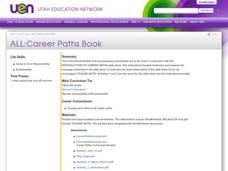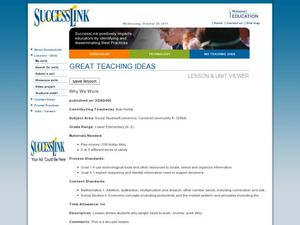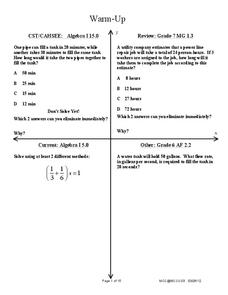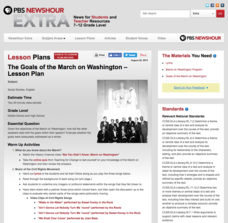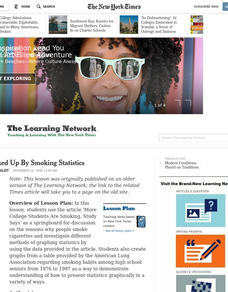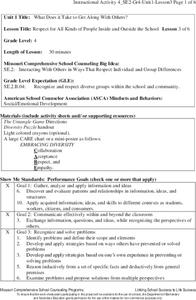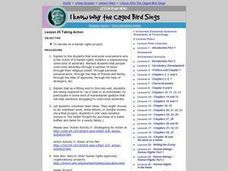Curated OER
ALL: Career Paths Book - Employability
Give reluctant learners a push down the road to career success using a lesson that includes a powerpoint, booklets, and worksheets. They view the presentation, follow along in the booklet, and discuss why people work. By the end of the...
Curated OER
Where People Work
Students investigate where people work. In this social studies lesson, students use a Landscape Picture to locate places of work. Students discuss how each job is similar and different.
National Endowment for the Humanities
Revolution '67, Lesson 1: Protest: Why and How
To some people, protesting is as American as apple pie, but the factors that lead to protests can be as confusing to veteran activists as to today's youth. Revolution '67 explores the riots in Newark, New Jersey as a case study. Using...
Council for Economic Education
The Economics of Income: If You’re So Smart, Why Aren't You Rich?
If basketball players make more than teachers, why shouldn't learners all aspire to play in the NBA? Unraveling the cost and benefits of education and future economic success can be tricky. Economic data, real-life cases, and some...
West Contra Costa Unified School District
Work Problems – Bar Models
Why do we have to do so much work? Scholars learn how to set up bar models to represent a situation involving work. They use these bar models to help set up equations with rational coefficients to solve the problem situation.
iCivics
Why Government?
Why do people create governments? Where did we get our ideas about government? This is a fantastic introductory instructional activity for your American government class that begins by reviewing the philosophies of Thomas Hobbes and John...
Curated OER
Hic-Hic-Hooray!
What is really the best way to get rid of hiccups? Investigate some old wives' tales and folk remedies related to health. Middle schoolers explore the science behind why people might believe these myths to be true and find the real...
PBS
The Goals of the March on Washington
Who else had a dream other than Martin Luther King, Jr.? Pupils explore civil rights leaders in a fourth lesson out of a series of five about people who paved the way to freedom for African Americans. The inquiry-based unit has your...
Curated OER
All Choked Up By Smoking Statistics
Scholars use the article "More College Students Are Smoking, Study Says" as a springboard for discussion on the reasons why people smoke cigarettes. They investigate different methods of graphing statistics by using the data provided in...
Crafting Freedom
Frances Ellen Watkins Harper: Lover of Literacy
This, the sixth in a series of 10 related resources, examines the life and works of Frances Ellen Watkins Harper, an African American author, born in 1825, who advocated literacy for both free and enslaved African Americans.
Curated OER
Ordinary People: Cubing Strategy
Readers of Ordinary People employ a cubing strategy based on Bloom’s Taxonomy to analyze, from multiple perspectives, an excerpt from Chapter 10 of Judith Guest’s novel. The excerpt, a rationale and complete directions for the activity...
EngageNY
Why Were Logarithms Developed?
Show your class how people calculated complex math problems in the old days. Scholars take a trip back to the days without calculators in the 15th installment of a 35-part module. They use logarithms to determine products of numbers and...
Polar Trec
Why Can’t I Eat This Fish?
Can turning on the television lead to toxins in the food supply? The lesson offers an opportunity for young scientists to complete guided research. A worksheet lists each question as well as the web page necessary to answer the question....
Curated OER
Why Can’t I Have Sugar? All About Diabetes
Begin the lesson plan by having your class write what they know about diabetes. They learn through a skit how the body metabolizes glucose. A visual representation of the two types of diabetes is displayed, and then learners participate...
US Institute of Peace
Organizations Working for Peace
We're all in this together! Show young scholars that peace is a process and having the support of like-minded people can make it happen. 13th in a series of 15 peace building activities, groups conduct research on a peace organization,...
Missouri Department of Elementary
Respect for All Kinds of People Inside and Outside the School
Why is it important to embrace diversity? Scholars explore the topic by learning about the CARE acronym: Collaboration, Acceptance, Respect, Empathy. They also complete a diversity puzzle worksheet and play a collaborative game that...
TCI
Picking Rusty Gold: Why Do People Buy and Sell Antiques?
Your historical sleuths will work to research the in-depth history of chosen artifacts and will use their research to design a fictional advertisement for an early 20th century item.
iCivics
Mini-Lesson: Gerrymandering
Who determines the structure of voting districts? The concept of gerrymandering brings to light the ongoing issue of how those running for office gain votes. Hands-on activities enable scholars to analyze the re-drawing of voting...
Curated OER
Why do People Migrate?
Second graders examine the reasons for human migration. In this human migration lesson, 2nd graders make lists of reasons why people migrate. Students view pictures of people who have migrated and discuss why. Then the students watch a...
The New York Times
Literary Pilgrimages: Exploring the Role of Place in Writers’ Lives and Work
Do the places you have lived influence what you write? Class members research the lives of writers and look for how places these writers have lived might have influenced their writings.
Curated OER
I Know Why the Caged Bird Sings: Taking Action
Learners create a human rights project based on their lesson with Maya Angelou's I Know Why the Caged Bird Sings. In this human rights lesson, students participate in a humanitarian gesture as volunteers by creating a human rights...
Curated OER
I Know Why the Caged Bird Sings: Human Rights
Students use Maya Angelou's I Know Why the Caged Bird Sings as analysis on human rights. In this human rights lesson, students develop an awareness of human rights issues and explore the Universal Declaration of Human Rights using the...
Curated OER
I Know Why the Caged Bird Sings
Young scholars identify the use of characterization in Maya Angelou's I Know Why the Caged Bird Sings. In this characterization lesson, students define characterization and write descriptive paragraphs about Maya Angelou's grandmother....


